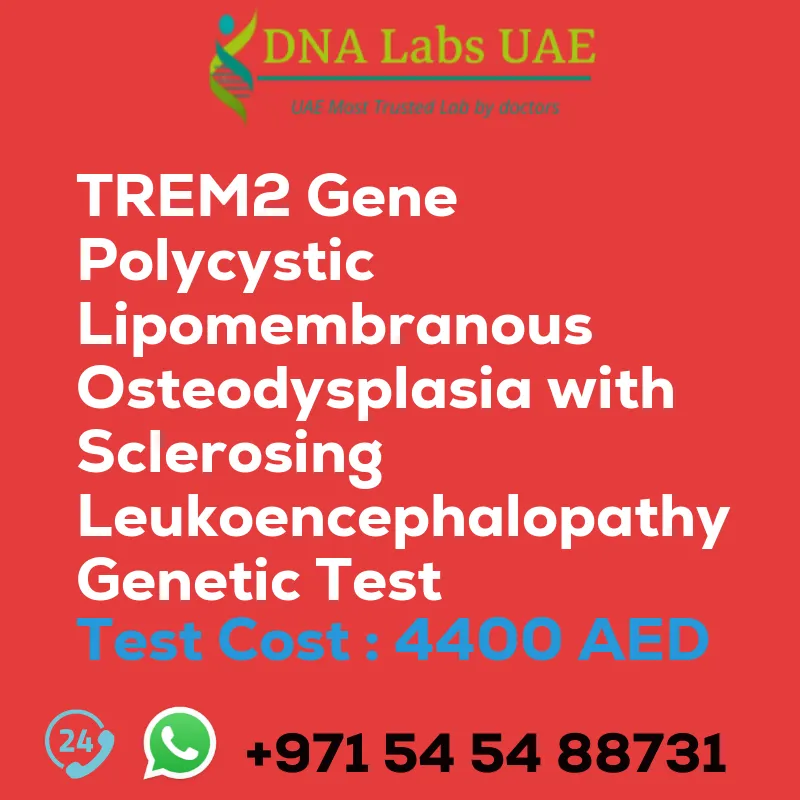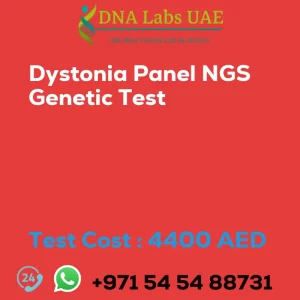TREM2 Gene Polycystic lipomembranous osteodysplasia with sclerosing leukoencephalopathy Genetic Test
Test Name: TREM2 Gene Polycystic lipomembranous osteodysplasia with sclerosing leukoencephalopathy Genetic Test
Components: Price: 4400.0 AED
Sample Condition: Blood or Extracted DNA or One drop Blood on FTA Card
Report Delivery: 3 to 4 Weeks
Method: NGS Technology
Test Type: Neurological Disorders
Doctor: Neurologist
Test Department: Genetics
Pre Test Information: Clinical History of Patient who is going for TREM2 Gene Polycystic lipomembranous osteodysplasia with sclerosing leukoencephalopathy NGS Genetic DNA Test. A Genetic Counselling session to draw a pedigree chart of family members affected with TREM2 Gene Polycystic lipomembranous osteodysplasia with sclerosing leukoencephalopathy
Test Details
Polycystic lipomembranous osteodysplasia with sclerosing leukoencephalopathy (PLOSL), also known as Nasu-Hakola disease, is a rare autosomal recessive disorder characterized by progressive neurodegeneration and bone abnormalities. It is caused by mutations in the TREM2 gene.
Next-generation sequencing (NGS) genetic testing is a powerful tool used to identify mutations in the DNA sequence of specific genes. In the case of PLOSL, NGS can be used to analyze the TREM2 gene and identify any disease-causing mutations. NGS genetic testing involves extracting DNA from a patient’s blood or other tissue sample and then sequencing the DNA using high-throughput techniques. The resulting DNA sequences are compared to a reference genome to identify any variations or mutations in the TREM2 gene.
By identifying mutations in the TREM2 gene, NGS genetic testing can provide a definitive diagnosis of PLOSL. This can be helpful for patients and their families in understanding the cause of their symptoms and for genetic counseling purposes.
It’s important to note that genetic testing for PLOSL should be performed by a qualified geneticist or genetic counselor, who can provide appropriate counseling and support throughout the testing process.
| Test Name | TREM2 Gene Polycystic lipomembranous osteodysplasia with sclerosing leukoencephalopathy Genetic Test |
|---|---|
| Components | |
| Price | 4400.0 AED |
| Sample Condition | Blood or Extracted DNA or One drop Blood on FTA Card o |
| Report Delivery | 3 to 4 Weeks |
| Method | NGS Technology |
| Test type | Neurological Disorders |
| Doctor | Neurologist |
| Test Department: | Genetics |
| Pre Test Information | Clinical History of Patient who is going for TREM2 Gene Polycystic lipomembranous osteodysplasia with sclerosing leukoencephalopathy NGS Genetic DNA Test A Genetic Counselling session to draw a pedigree chart of family members affected with TREM2 Gene Polycystic lipomembranous osteodysplasia with sclerosing leukoencephalopathy |
| Test Details |
Polycystic lipomembranous osteodysplasia with sclerosing leukoencephalopathy (PLOSL), also known as Nasu-Hakola disease, is a rare autosomal recessive disorder characterized by progressive neurodegeneration and bone abnormalities. It is caused by mutations in the TREM2 gene. Next-generation sequencing (NGS) genetic testing is a powerful tool used to identify mutations in the DNA sequence of specific genes. In the case of PLOSL, NGS can be used to analyze the TREM2 gene and identify any disease-causing mutations. NGS genetic testing involves extracting DNA from a patient’s blood or other tissue sample and then sequencing the DNA using high-throughput techniques. The resulting DNA sequences are compared to a reference genome to identify any variations or mutations in the TREM2 gene. By identifying mutations in the TREM2 gene, NGS genetic testing can provide a definitive diagnosis of PLOSL. This can be helpful for patients and their families in understanding the cause of their symptoms and for genetic counseling purposes. It’s important to note that genetic testing for PLOSL should be performed by a qualified geneticist or genetic counselor, who can provide appropriate counseling and support throughout the testing process. |








